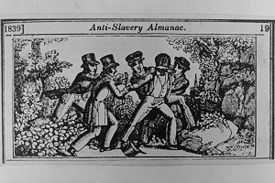
Slave patrol
Encyclopedia

Slavery
Slavery is a system under which people are treated as property to be bought and sold, and are forced to work. Slaves can be held against their will from the time of their capture, purchase or birth, and deprived of the right to leave, to refuse to work, or to demand compensation...
s during the antebellum U.S. southern states. They policed the slaves on the plantation
Plantation
A plantation is a long artificially established forest, farm or estate, where crops are grown for sale, often in distant markets rather than for local on-site consumption...
s and hunted down fugitive slaves. Patrols used summary punishment against escapees, which included maiming or killing them. Beginning in 1704 in South Carolina
South Carolina
South Carolina is a state in the Deep South of the United States that borders Georgia to the south, North Carolina to the north, and the Atlantic Ocean to the east. Originally part of the Province of Carolina, the Province of South Carolina was one of the 13 colonies that declared independence...
, slave patrols were established and the idea spread throughout the southern states.
History
Slave patrols began with colonial attempts to regulate slavery through laws that limited enslaved people's abilities and required all settlers to assist in enforcing the slave codes. As the population of black slaves increased, so did the fear and threat of foreign invasion which further increased the institution of slave patrols. Encountered slaves without passes were expected to be returned to their owners, and sometimes punished. As this approach became more ineffective, Slave patrols were formally established. Slave patrols consisted of white men from all social classes. This caused trouble for both enslaved and free black people as it restricted their movement. Black people were subjected to question, searches, and other forms of harassment, often leading to whippings and beatings for people who may not have broken any law.Slave patrols "apprehended runaways, monitored the rigid pass requirements for blacks traversing the countryside, broke up large gatherings and assemblies of blacks, visited and searched slave quarters randomly, inflicted impromptu punishments, and as occasion arose, suppressed insurrections." During these times, slaves were often neglected and mistreated despite having permission to travel.
Slave owners feared slave gatherings would allow them to trade or steal goods and the potential for a rebellion. South Carolina and Virginia
Virginia
The Commonwealth of Virginia , is a U.S. state on the Atlantic Coast of the Southern United States. Virginia is nicknamed the "Old Dominion" and sometimes the "Mother of Presidents" after the eight U.S. presidents born there...
selected patrols from state militias. Slave patrols were often equipped with guns and whips and would exert brutal and racially motivated control. At times African Americans developed many methods of challenging slave patrolling, occasionally fighting back violently. The American Civil War
American Civil War
The American Civil War was a civil war fought in the United States of America. In response to the election of Abraham Lincoln as President of the United States, 11 southern slave states declared their secession from the United States and formed the Confederate States of America ; the other 25...
developed more opportunities for resistance against slave patrols and made it easier for enslaved people to escape.
Fugitive Slave Laws
The Fugitive Slave LawsFugitive Slave Law of 1850
The Fugitive Slave Law or Fugitive Slave Act was passed by the United States Congress on September 18, 1850, as part of the Compromise of 1850 between Southern slave holding interests and Northern Free-Soilers. This was one of the most controversial acts of the 1850 compromise and heightened...
helped enforced the necessity for slave patrols in order to abide by the law. Although initially these laws were created to keep tensions low between the north and the south, it caused the physical formation of slave patrols. During the Civil War, the theory of Contraband (American Civil War)
Contraband (American Civil War)
Contraband was a term commonly used in the United States military during the American Civil War to describe a new status for certain escaped slaves or those who affiliated with Union forces after the military determined that the US would not return escaped slaves who went to Union lines to their...
prevented the return of Southern slaves who reached Union-held territory. This helped limit the role of slave patrols/catchers and changed the war. Another form of help for slaves was the Underground Railroad
Underground Railroad
The Underground Railroad was an informal network of secret routes and safe houses used by 19th-century black slaves in the United States to escape to free states and Canada with the aid of abolitionists and allies who were sympathetic to their cause. The term is also applied to the abolitionists,...
which aided slaves in their escape to northern states. The use and physical formation of slave patrols came to its end in 1865 when the Civil War ended. This end however is linked to post civil war groups such as the Ku Klux Klan
Ku Klux Klan
Ku Klux Klan, often abbreviated KKK and informally known as the Klan, is the name of three distinct past and present far-right organizations in the United States, which have advocated extremist reactionary currents such as white supremacy, white nationalism, and anti-immigration, historically...
, which continued to terrorize and threaten the black community.
External links
- Hummel, Jeffrey Rogers (July 2002). "Review of Sally E. Hadden - Slave Patrols: Law and Violence in Virginia and the Carolinas." Economic History Services
- Time Warner Unchained Memories: Readings From the Slave Narratives

